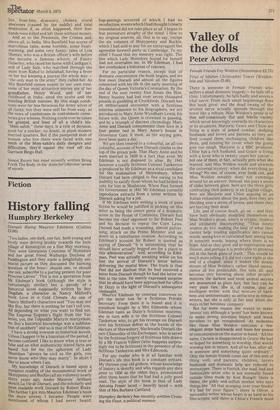Fiction
History falling
Humphry Berkeley
Disraeli Rising Maurice Edelman (Collins £3,00) "Two ladies, one dark, one fair, both young and lovely were driving briskly towards the little Village of Kensington on a fine May morning. They were Georgiana Countess of Montdore and her great friend Walburga Duchess of Paddington and they made a delightfully animated picture as they discussed the burning question of the hour— should one, or should one not, subscribe to a parting present for poor Princess Lieven". This is not a quotation from Mr Edelman's book (although the style is. tantalisingly similar) ' but a parody of a historical novel supposedly written by Boy Dugdale, a character in Nancy Mitford's book Love in a Cold Climate. As one of Nancy Mitford's characters said "You may not like Boy, but there is nothing he can't tell you. All depending on what you want to find out. The Empress Eugenie's flight from the Tuileries, yes, the Tolpuddle Martyrs martyrdom, no ..Boy's historical knowledge was a sublimation of snobbery" and so IS that of Mr Edelman.
I have a strong aversion to historical novels. Unless I happen to be a historian of the period, I become confused. I like to know what is true or false and on what authenticity stated facts are based. Not for me the aphorism of Lady Montdore "always be civil to the girls, you never know who they may marry". In short I like to know where I am.
My knowledge of Disraeli is based upon a complete reading of the monumental work of Monypenny and Buckle (all six volumes) nearly thirty years ago, Andre Maurois' brilliant sketch La Vie de Disraeli, and the scholarly and Most readable work Disraeli by Robert Blake. The further I got into Maurice Edelman's book the more uneasy I became. People were mentioned of whom I had never heard;
hap-penings occurred of which I had no recollection; events which I had thought I clearly remembered did not take place at all. I began to fear premature atrophy of the mind. I flew to my original sources, all, that is to say, except the six volumes of Monypenny and Buckle, which I had sold to pay for an extravagant but agreeable farewell party at Cambridge. To my• relief I found that my memory was right. The fate which Lady Montdore feared for herself had not overtaken me. In Mr Edelman, I had not overlooked a historian of renown.
For no particular reason, except that of dramatic convenience, the book begins, and we first meet Disraeli and almost all the figures connected with his life in the early morning of the day of Queen Victoria's Coronation. By the end of the next twenty four hours the Hon. Henry Stanley had lost over seven thousand pounds in gambling at Crockfords. Disraeli has an embarrassed encounter with a fictitious mistress unknown to his biographers, we are introduced to Mary Anne Wyndham Lewis, his future wife, the Queen is crowned in passing, and by a triumph of discreet chron6logy Mary . Anne and Disraeli consummate their love in a four poster bed in Mary Anne's house in Grosvenor Gate. It must, as the saying goes, have been quite a day.
We are then treated to a colourful, an all too colourful, account of how Disraeli climbs to the top of the greasy pole. That Mary Anne and he were married in 1839 is a fact that even Mr Edelman is not disposed to alter. By 1841 however a totally fictitious Colonel Tankerton is produced by Mr Edelman as a rival candidate for the nomination of Shrewsbury, where Disraeli had been obliged to flee owing to his inability to satisfy those whom he had bribed to vote for him in Maidstone. When Peel formed his Government in 1841 Mr Edelman correctly reproduces extracts from a letter written by Disraeli asking for a job. If Mr Edelman were writing a work of pure fiction he would be justified in picking on this letter as being the centre piece of a dramatic scene in the House of Commons. Disraeli had become the chief opponent to Sir Robert Peel and his decision to repeal the Corn Laws. Disraeli had made a wounding, almost pulverising, attack on the Prime Minister and sat down to a tumultuous ovation. According to Edelman's account Sir Robert is quoted as saying of Disraeli "It is astonishing that he should .have actually begged me for a place in this administration". And, according to Edelman, Peel was actually awaiting while on his feet the arrival of Disraeli's letter before delivering the mortal blow. The truth is that Peel did not disclose that he had received a letter from Disraeli though he had the letter on him at the time. He merely expressed surprise that he should have been approached for office by Dizzy in the light of Disraeli's subsequent onslaught. Maurice Edelman by contrast contrives to get the letter lost by a fictitious Private Secretary. From there it is found and it is somehow bought by a Mrs Edmonds whom Edelman casts as Dizzy's fictitious mistress; she in turn sells it to the fictitious Colonel Tankerton who, to get his revenge on Disraeli over his fictitious defeat at the hands of the electors of Shrewsbury, blackmails Disraeli the new Chancellor of the Exchequer, who is saved by the fictitious forgery of fictitious bills drawn by a Mr Francis Villiers (who happens surprisingly not to be fictitious) in the presence of the fictitious Tankerton and Mrs Edmonds.
For any reader who is at all familiar with Disraeli's life this book is a constant irritant. My thirteen year old godson, whose knowledge of history is sketchy and who regards any date prior to 1950 as the olden days, pronounced after three hours that he had had a jolly good read. The style of the book is that of Lady Antonia Fraser laced — heavily laced — with that of Mrs Barbara Cartland.










































 Previous page
Previous page